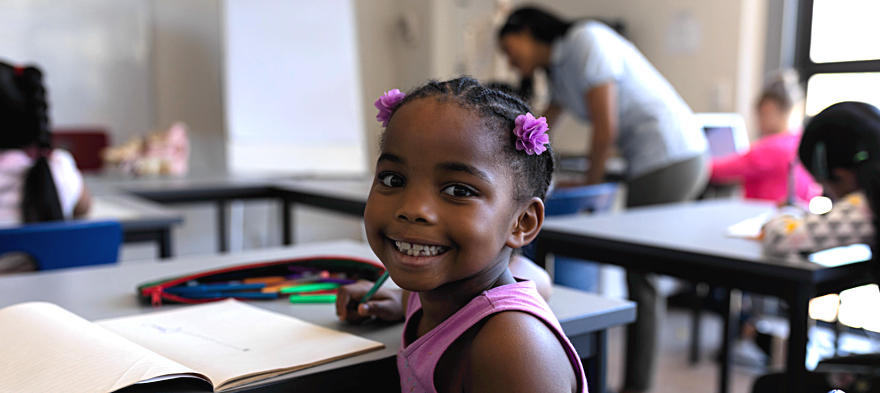
Apr 7, 2020 12:00:00 AM
We’re facing a global emergency where tens of millions of children are seeing their education disrupted. But the truth is that for many kids and families, it has always been this way.
Almost three years ago, I coined the phrase “disrupted education pathways” to describe the experiences of young people whose life circumstances make it hard to get to school every day—and hard to succeed even once they get there. These young people experience circumstances like foster care placement, homelessness, incarceration, or an early, unplanned or unwanted pregnancy.
The widespread disruptions to our country’s entire education system are a momentary step into the shoes of students who have lived fragile lives for a long time. The difference is that many of us will eventually be able to step out of those shoes and into a world that will plan for and accommodate this big disruption.
But [pullquote]if we exercise empathy now, that will help us to focus on equity.[/pullquote] We will all be much better off on the other side by building innovative education solutions that meet more needs and meet them more effectively. And we do that by starting with empathy. Empathy isn’t a feel-good sensation: it’s a mindset that changes your behavior.
How can you turn your empathy into action? There are two specific empathy switches to flip right now if you haven’t already:
There are jokes going around about the panicked grocery trips that people have gone on, intending to stock up for quarantine, but coming home with nothing but off-brand pickles and a gallon of mayonnaise. And perhaps your colleagues are giving each other space to be less productive than usual, understanding all of the stress that folks are under, in addition to new responsibilities like caring for children home from school.
That feeling of defeat and the inability to concentrate on even simple tasks is the effect that stress has on cognition and decision-making. Panicked decision-making in the face of frustration is familiar to a lot of people, and it’s what survival has felt like every single day for millions of kids and families in this country who live life always one mistake away from catastrophe.
Mobilizing empathy for students who have long tried to manage the effects of this cognitive load means building processes and setting expectations that allow for second, third and fourth chances. Empathetic responses allow young people and families to express vulnerability, ask for help and fail without disaster—and give them robust guidance as they navigate life and school.
Of all the teachers I have talked to in the last two weeks, the ones weathering the transition the best are teachers who work in alternative schools. They are the ones who have always needed to be flexible and adaptive, the ones whose programs were created with the highest-need user in mind. They serve students who have special educational needs and learning gaps, who are working full-time jobs or are parenting, so these educators have always planned for contingencies and expected last-minute changes.
Inclusive design—an approach to creating programs and services that prioritize accessibility— is meant to work for everyone from the very beginning. It means that [pullquote position="right"]making adjustments is always part of the work, not a distraction from it.[/pullquote] Intentional, inclusive design in education means that anyone creating curricula, services or resources must focus on the needs of everyone while paying especially close attention to those experiencing the most difficulty.
Empathetic responses to our current crisis cannot be utilitarian, offering the greatest good for the greatest number: that is a short-sighted response that will only deepen and calcify existing inequity. Instead, they must take a long view. If we experience this shared crisis as an opportunity to turn our own fear and frustration into empathy for those who have been in crisis for years, then we stand a real chance of creating new ways of working together and caring for one another that are better and more equitable on the other side.
Hailly T.N. Korman is a senior associate partner at Bellwether Education Partners on the Policy and Evaluation team. She focuses on correctional education, justice-involved youth and school discipline. Hailly supports justice agencies and their education partners as they work to craft practices that significantly improve outcomes for justice-involved students, and she advocates for systemic reforms that mitigate the institutional obstacles to providing high-quality education services to youth in secure schools.
The story you tell yourself about your own math ability tends to become true. This isn’t some Oprah aphorism about attracting what you want from the universe. Well, I guess it kind of is, but...
If you have a child with disabilities, you’re not alone: According to the latest data, over 7 million American schoolchildren — 14% of all students ages 3-21 — are classified as eligible for special...
The fight for educational equity has never been just about schools. The real North Star for this work is providing opportunities for each child to thrive into adulthood. This means that our advocacy...
Your donations support the voices who challenge decision makers to provide the learning opportunities all children need to thrive.
Ed Post is the flagship website platform of brightbeam, a 501(c3) network of education activists and influencers demanding a better education and a brighter future for every child.
© 2020–2024 brightbeam. All rights reserved.
Leave a Comment